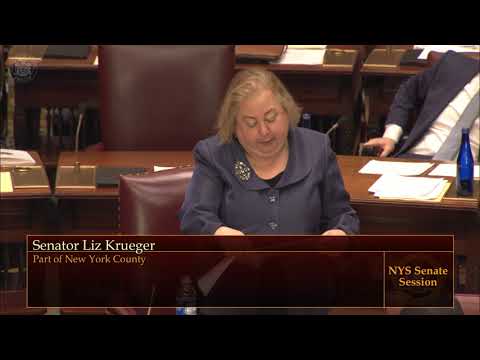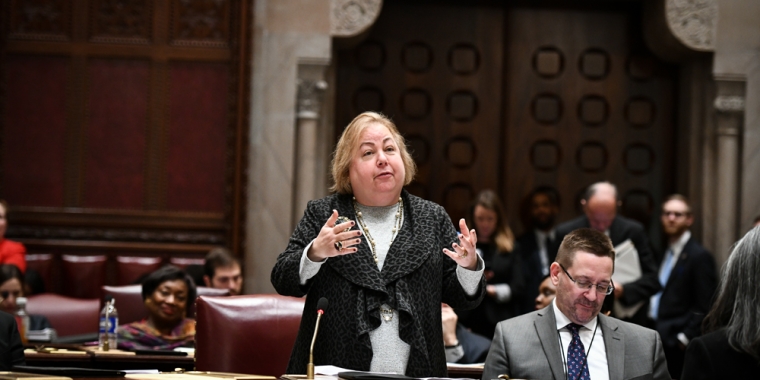
Gottfried, Krueger, Advocates Announce Reintroduction of New York Maternal Depression Bill to Help New Mothers and Families
Liz Krueger
May 19, 2014
-
ISSUE:
- Health
- Women's Health
Sen. Krueger and Assembly Health Committee Chairman Richard Gottfried today announced their reintroduction of legislation providing education, and promoting screening and treatment-referrals for postpartum depression and other maternal depression disorders (S. 7234 / A. 9610). Despite the widespread nature and severity of maternal depression, our healthcare system has no system-wide screening and referral procedure.
A previous version of this legislation passed both houses in the 2013 legislative session but was vetoed due to technical concerns over certain provisions in the bill. The new, 2014 version of the Gottfried-Krueger legislation addresses those concerns while accomplishing the goal of increasing identification of maternal depression cases, thereby improving outcomes for new mothers, newborns, and families.
“Maternal depression” includes a range of perinatal mood disorders, emotional and psychological reactions a woman may experience during pregnancy or up to a year after childbirth. Symptoms can include feelings of despair or guilt, sadness, fatigue, difficulty concentrating, changes in appetite, and thoughts of suicide or of harming the baby. Maternal depression includes prenatal depression, “baby blues,” postpartum anxiety, postpartum depression, and postpartum psychosis. The latter is the severest of these conditions, often including hallucinations and delusions, and results in infanticide and suicide rates of four and five percent, respectively.
Maternal depression affects a significant portion of pregnant women and new mothers. Each year, approximately 10 to 15 percent of new mothers develop postpartum depression, while 50 to 80 percent of new mothers will experience “baby blues.” A small but significant number – about 0.1 to 0.2 percent of new mothers – develop symptoms serious enough to be considered postpartum psychosis.
In part because of the lack of a system-wide screening and referral procedure, these conditions often go undiagnosed or inadequately treated, leading to tragic results, as in the highly-publicized case of 44-year old Manhattan resident Cynthia Wachenheim, whose suicide last year came after she exhibited symptoms consistent with maternal depression.
Treatment for maternal depression has an 80 to 90 percent success rate. Early diagnosis and treatment – the goals of this legislation – significantly improve prognoses. Assembly Member Gottfried and Senator Krueger’s legislation would authorize the Commissioner of Health to provide screening guidelines for maternal health care providers to use with patients during pregnancy and after childbirth. The bill would also add maternal depression materials to maternity education and outreach programs for new mothers and their families.
In addition, the bill would bar insurance companies from requiring a special referral for maternal depression screening by obstetricians and pediatricians. Because pregnant women visit their obstetrician and new mothers visit their infants’ pediatrician more often than they would any other health professional, these health care providers are in an ideal position to screen women for maternal depression.
Finally, under this bill the Department of Health would also provide a list of treatment providers, including support groups and nonprofit organizations.
“Many new parents and families aren’t aware of just how common maternal depression is, and too often cases go untreated,” said Senator Krueger. “This bill will spur greater awareness, early detection, and treatment of maternal depression.”
“A key element of the bill is recognizing that the newborn’s pediatrician can have an important role in identifying maternal depression,” said Assembly Health Committee Chairman Richard Gottfried. “The bill incorporates all the technical concerns the governor’s office raised last year, so we hope to get it passed in both houses and signed into law. Early screening for postpartum depression is effective for families and offers long-term emotional benefits and health care cost savings.”
The legislation is strongly supported by patients’ advocates, including the family of Cynthia Wachenheim, whose tragic suicide reignited a national conversation on maternal depression, and Paige Bellenbaum, a senior executive with the Settlement Housing Fund whose personal battle with postpartum depression spurred her to advocate for the legislation. The legislation was also supported by the Postpartum Resource Center of New York.
“Our family will feel the pain of losing Cindy for the rest of our lives. Our hope is that this legislation will help prevent other families from needlessly losing a loved one by educating them about maternal depression and mood disorders so they can recognize the signs and access appropriate and effective treatment,” said Deborah and Ron Wachenheim.
“I suffered from severe postpartum depression with my first child, and even as a social worker who is trained to recognize mental illness symptoms, I had no idea what was wrong with me or where to go for help. I felt ashamed and embarrassed. This debilitating condition nearly cost me my life. Seven years later, it is my greatest hope that this will be the year New York State acts to increase screening and treatment, so all at-risk women have the best chance possible of being diagnosed, getting the help they need, and recovering, as I did,” said Paige Bellenbaum.
“New York mothers, fathers and family members need to know they are not alone, not to blame and that they will feel better and be well with help. This legislation is critical to further help strengthen the maternal depression safety net for the prevention of tragedies,” added Sonia Murdock, Executive Director and Co-Founder of the Postpartum Resource Center of New York.
The legislation is also cited as an important step forward by healthcare and mental health experts representing a variety of New York medical institutions, including the American Academy of Pediatrics (AAP) District II, the American Congress of Obstetricians and Gynecologists (ACOG) District II, New York University Medical Center, and Bellevue Hospital Center.
“Most new mothers visit the pediatrician for their infant’s check-ups and health/sick visits more often than they would visit any other health professional in the year after the birth of their child,” said Dr. Danielle Laraque, MD, FAAP, New York State AAP Chair. “Therefore, it makes sense to create a process for pediatricians to screen and refer new mothers who may be struggling with postpartum depression. Early screening and identification of maternal depression has an 80 to 90 percent success rate and offers long-term health care costs savings. It also helps support healthy child development and addresses issues of early childhood mental health challenges.”
“There is a growing evidence base supporting early detection and treatment of perinatal mood disorders. Clinically, we see excellent outcomes when women receive appropriate mental health treatment; ultimately benefiting the mother, the infant, and the entire family,” said Dr. Judy A. Greene, MD, Director of Women's Mental Health and Training Director for the Reproductive Psychiatry Fellowship at Bellevue Hospital Center.
The previous year’s version of this legislation, A7667B / S3137C, passed both houses unanimously. Assemblymember Gottfried and Sen. Krueger are hopeful that this new version of the legislation will move expeditiously in the final six weeks of the 2014 session. The legislation is scheduled for votes in the both the Assembly's and the Senate's respective Health Committees on Tuesday, May 20.
Share this Article or Press Release
Newsroom
Go to NewsroomSenate Majority Protects New York Students And Pedestrians
March 19, 2019

Senator Krueger's Community Bulletin - March 2019
March 7, 2019


